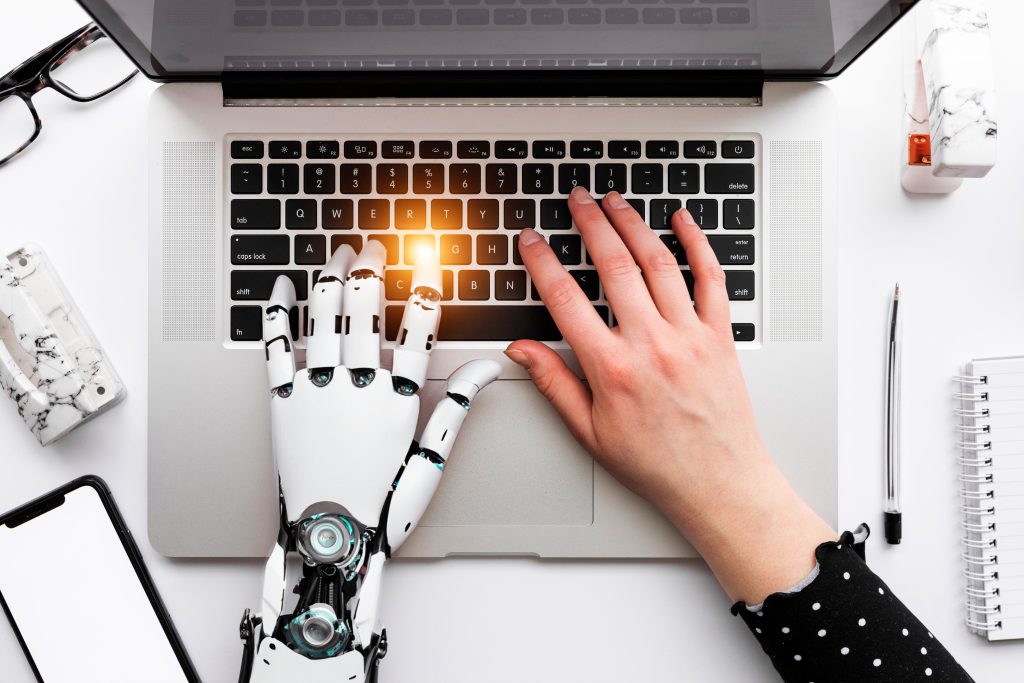| By Janine Karam |
| “Ce n’est pas l’espèce la plus forte qui survit, ni la plus intelligente, mais celle qui réagit le mieux au changement” -Charles Darwin Les leaders ont-ils besoin de craindre l’avènement de l’IA? Va-t-elle acquérir les compétences essentielles des bons leaders pour pouvoir un jour prendre leur place et les reléguer, ironiquement, au rang des serpuariens de nos organisations? Forbes indicates that 81% of millennials fear that AI technology will fully or partially replace them. Hollywood productions and science fiction books have contributed to fueling this wave of concern. The Matrix, West World, Blade Runner, 2001: A Space Odyssey by Arthur C. Clarke, and many other films and books have presented a dystopian vision of humanity's future. The abilities and skills of the heroic leaders we followed in these works seem unattainable, and our perception of AI is so influenced by them that we feel it's a competition between the machine and the hero-leader, where one will eventually replace the other. What is the reality? La Harvard Business Review presents the controversy as follows: "The question of whether AI will replace human workers assumes that AI and humans have the same qualities and capabilities - but in reality, this is not the case. AI-based machines are fast, more accurate, and always rational, but they are not intuitive, emotional, or sensitive to culture. These are precisely the abilities that humans possess and which make us effective." Organizations have increasingly sophisticated digital tools that were unimaginable just a few years ago; clearly, AI is destroying jobs and creating others, just as has happened over thousands of years of human history, where almost every progress, feared at the beginning, eventually got tamed and adapted to real life. Toutefois, les rôles qu’occupent les leaders dans nos organisations sont des plus sophistiqués, et les organisations elles-mêmes sont des organismes vivants et complexes régis par des valeurs qui dépassent les simples objectifs financiers. LEADER vs INTELLIGENCE ARTIFICIELLE Relational Intelligence and Emotional Intelligence Avec l’analyse des micro-expressions du visage, de la posture, de ce qui est dit, des messages écrits, l’IA pourra bientôt détecter les signaux de démobilisation des employés, mais elle ne pourra pas maîtriser l’intelligence relationnelle (l’écoute active) et l’intelligence émotionnelle (l’empathie) pour répondre à ces signaux. Les leaders devront continuer à développer ce type d’intelligences, pour assurer une complémentarité avec l’IA. En effet, plus sophistiqués sont les outils, plus les soft skills requises d’un leader sont indispensables, parce que c’est à lui que revient la responsabilité de les implanter et d’optimiser leur utilisation au sein de l’équipe et surtout de gérer les réticences et les inquiétudes. L’IA ne possède pas de subjectivité, ne ressent pas les émotions, ne se met pas à la place de l’autre, et donc ne peut ressentir et utiliser de l’empathie (pas encore en tout cas). Or, un collaborateur qui reçoit une mauvaise nouvelle, ou qui vit une situation difficile, ou qui a des difficultés dans ses tâches, a besoin d’une empathie réelle de la part de son leader, pas simulée, et cette compétence prend une importance accrue dans une monde en transformation de plus en plus rapide et complexe. Cognitive Intelligence and Gognitive Flexibility Here is the translation: As cognitive intelligence is now mastered by AI, the leader will need to develop cognitive flexibility (his ability to adapt) in order to handle constantly evolving situations. He will need to develop advanced cognitive skills, such as ethical reflection, analyzing complex situations, openness to diversity, managing creative thinking, and developing collaborative strategies. While AI provides him with data and analysis in a fast and optimal way, he will have to decide how to handle them. When AI informs him with a graph that Fred is behind on his performance target, it is up to him to discuss the issue with Fred to find the root of the problem and address it. If AI signals a decrease in engagement within the team, it is up to him to understand the deep motivations and working styles of the team members and design improvement and resolution strategies with them. He must also develop the ability to critically assess the data provided by AI. Advice for Leaders Formez vous You must tame the beast before deploying it for use in your team. Understand how AI works and affects your business, how it can add value to your operations, by educating yourself about the topic in your industry and seeking advice and tips from experts. Soyez empathiques ET transparents It is true that it is problematic when an employee contests the adoption of AI; it's the same employee who refused to use the internet 25 years ago. However, the reluctance is understandable and must be acknowledged, and discussing it is the first step toward acceptance. The employee wants reassurance and also appreciates honesty. Communiquez clairement: In detail and with supporting examples, explain to the concerned employees the redistribution of tasks between them and the AI, and how this will affect their daily work, emphasizing the advantages that will allow them to become more efficient, free themselves from repetitive and time-consuming tasks, and focus on more intellectually stimulating projects that they say they never have time to tackle. Faites participer vos collaborateurs au processus décisionnel: When implementing AI, ask for the opinions and concerns of your employees. An employee who is listened to will feel valued and respected, and will actively contribute to the success of the project. Priorisez la relation humaine avec vos collaborateurs: There is no turning back, AI is here to stay, AND humans are here to control it. Train your collaborators technically because new skills need to be introduced, such as AI ethics, vigilance against cyberattacks, etc., and don't forget the emotional aspect; training on change management is very relevant in this context. If your employee manages to adopt an open attitude, they will feel in control of the situation and not the other way around. They will treat AI as a tool at their disposal and won't feel threatened by it. Prenez soin de votre santé psychologique et physique : AI is a machine that can operate 24/7 without sick leave, holidays, etc. It will provide you with information continuously. Not you. To conclude, while this is really just the beginning... AI is entering organizations, and leaders are learning to relinquish part of their power to an algorithm, delegating certain tasks to it that it can perform more efficiently. Thanks to AI, leaders will be freed from time-consuming tasks (such as project planning and management, monitoring, applying standards and regulations, etc.). Their operations will be enhanced, and their decisions more informed because they will be assisted by a smart, high-performance tool (optimizing emails, data, and resources, scheduling appointments, personalizing presentations, etc.). This will allow them to focus more on human activities with their teams and on the development of creative and innovative strategies. Une des multitudes questions qui se posent désormais est la suivante : Si la décision stratégique que prendra un jour le leader, basée sur l’analyse des données (provenant de l’IA ou non), son intuition, son expérience, son expertise, mais aussi sujette aux biais cognitifs, contredise celle prise par l’IA, quelle autorité va prôner? |





